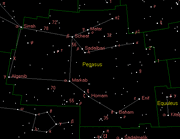
Pegasus in the cosmos
The stellar constellation in which the star system Cassandra which the planet Vortex is part of can be found.
Real life[]
From Crystallinks description
Pegasus is a northern northern sky, named after the winged horse Pegasus in Greek mythology. It was one of the 48 constellations listed by the 1st century astronomer Ptolemy, and remains one of the 88 modern constellations. It is one of the 88 modern constellations, and was also one of the 48 constellations listed by Ptolemy. Its three brightest stars together with Alpha Andromedae form the large asterism known as the Square of Pegasus. A star in this constellation, 51 Pegasi, is orbited by the first true extrasolar planets (planets orbiting a star other than the Sun) to have been discovered. Neighboring constellations: Vulpecula - Delphinus - Equuleus - Aquarius - Pisces - Andromeda - Lacerta - Cygnus .
M15
Named Stars:
- Markab (Alpha Peg)
- Scheat (Beta Peg)
- Algenib (Gamma Peg)
- Enif (Epsilon Peg)
- Homan (Zeta Peg)
- Matar (Eta Peg)
- Baham (Theta Peg)
- Salm (Tau Peg)
Originally the fourth star was called delta Peg, but nowadays this star is assigned to the neighboring constellation Andromeda.
In the early evenings of October, and later in earlier months, look straight up at the zenith and measure one palm-width to the south and one to the east; you will find the Great Square of Pegasus, the Winged Horse. Confusingly, the Horse flies upside down. The southwestern-most of the stars of the square is white Markab. Its neighboring corners are deep yellow Scheat and fainter white Algenib. You can probably make out the horse's head, neck and front legs extending to the west.
mythology[]
In Greek Mythology Pegasus was a winged white horse sired by Poseidon, in his role as horse-god, and foaled by the Gorgon Medusa.
In Mythology Pegasus is the white Seahorse of Revelation, the white seahorse in the sky, and the white seahorse of memory within you. In the human body the place of memory is called hippocampus which means seahorse.
There are several versions of the birth of the winged stallion and his brother Chrysaor. One is that they sprang from Medusa's neck as Perseus was beheading her, similar to the manner in which Athena was born from the head of Zeus. Another version also has Perseus beheading Medusa, but instead, they were born of the earth, fed by the Gorgon's blood. A variation of this story holds that they were formed from the mingling of Medusa's blood and sea foam, implying that Poseidon had involvement in their making.
Pegasus aided the hero Bellerophon in his fight against both the Chimera and the Amazons. There are varying tales as to how Bellerophon found Pegasus, some say that the hero found him drinking at the Pirenean spring and that Polyidus told Bellerophon how to find and tame him, others that either Athene or Poseidon brought him to Bellerophon.
Prior to aiding Bellerophon, Pegasus brought thunderbolts to Zeus, and following Bellerophon's death he returned to Mount Olympus to aid the gods. Two springs were supposedly created when Pegasus's hoof struck the earth; one on Mount Helicon at the behest of Poseidon to prevent the mountain swelling too much and another at Troezen. Pegasus was eventually turned into a constellation, but a single feather fell to the Earth near the city of Tarsus (hence its name).
Pegasus flew to mount Helicon, where, striking the ground with his hoof, a stream began to flow which became sacred to the Muses. When Bellerophon was giving the task of killing the Chimara, he was advised to procure Pegasus for the battle. Minerva gave Bellerophon a golden bridle and showed him Pegasus drinking at the well of Pirene. At the sight of the bridle, Pegasus approached and allowed himself to be captured. With Pegasus' help, the Chimaera was easily defeated.
This conquest and other successes with Pegasus caused Bellerophon to become swell headed. He attempted to fly Pegasus to Olympus to join the gods. An angry Zeus sent an insect to sting Pegasus, causing him to throw Bellerophon from his back. Bellerophon thereafter wandered the earth alone, lame and blind in consequence. Some stories place Pegasus in Zeus' stables after this, entrusted with the task of bringing thunderbolts and lightning to the god.
